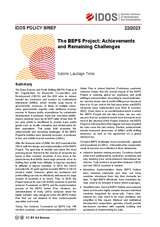Policy Brief
The BEPS Project: achievements and remaining challenges
Laudage Teles, SabinePolicy Brief (22/2023)
Bonn: Geman Institute of Development and Sustainability (IDOS)
DOI: https://doi.org/10.23661/ipb22.2023
The Base Erosion and Profit Shifting (BEPS) Project of the Organisation for Economic Co-operation and Development (OECD) and the G20 aims to reduce harmful tax avoidance and evasion by multinational enterprises (MNEs), which creates large losses in governments’ revenues. In times of multiple crises, many governments urgently seek additional revenue sources to finance public expenditures for sustainable development. In particular, many low- and lower-middle-income countries have tax-to-GDP ratios of less than 15 per cent, which is insufficient to provide basic public goods such as health, education and infrastructure for their populations. This policy brief evaluates the achievements and remaining challenges of the BEPS Project to mobilise more domestic revenues, in particular in low- and middle-income countries (LMICs).
After the financial crisis of 2009, the G20 mandated the OECD with the design and implementation of the BEPS Project. The goal was to identify and tackle the most pressing issues that led to the erosion of corporate tax bases in their member countries. A key issue is the phenomenon that MNEs avoid large amounts of tax by shifting their profits from affiliates in high-tax countries to affiliates in low-tax countries. In 2013, the OECD presented its 15-point agenda to tackle BEPS in OECD member states. However, global tax avoidance and profit shifting can only be effectively addressed if a large number of countries is on board. Thus, in 2016, the Project opened for non-OECD/G20 countries to join the Inclusive Framework on BEPS and the implementation process of the BEPS Action Plan. However, tax administrations of many LMICs complain about the highly complex rules designed under the BEPS Action Plan that are not adapted to their context-specific capacities and needs.
Today, the Inclusive Framework on BEPS has 145 member countries, and the implementation of the BEPS Action Plan is almost finished. Preliminary academic evidence shows that the overall impact of the BEPS Project in reducing global tax avoidance and profit shifting is indeed limited. According to recent estimates, tax revenue losses due to profit shifting even increased from 9 to 10 per cent in the first years when anti-BEPS measures were implemented (see Wier & Zucman, 2022). Since there is no counterfactual world in which the BEPS Project did not take place, we can only assume that tax avoidance would have increased even more in the absence of the Project. However, the BEPS Project is still considered the biggest overhaul of global tax rules since the last century. Positive achievements include increased awareness of MNEs’ profit shifting behaviour, as well as the agreement on a global minimum tax.
To tackle BEPS challenges more successfully – globally and in particular in LMICs – international tax coopera¬tion needs to become more effective in three dimensions:
- Inclusive decision-making process: Countries should show more political will to combat tax avoidance and stop blocking more comprehensive international tax reforms. Truly inclusive cooperation between OECD and non-OECD countries is needed.
- Mandatory implementation: Many BEPS Actions were voluntary standards and, thus, not many countries introduced them into their domestic tax laws. To fight BEPS effectively, more mandatory tax rules need to be included in future reform packages.
- Simplified rules: Several BEPS Actions were watered down and became highly complex because individual countries bargained for carve-outs. Future inter¬national tax rules need to be more ambitious and simplified in this regard. Bilateral and multilateral development cooperation agencies should provide low-income countries with capacity building and assistance in implementing tax rules.
Kontakt
Cornelia Hornschild
Koordinatorin Publikationen
E-Mail Cornelia.Hornschild@idos-research.de
Telefon +49 (0)228 94927-135
Fax +49 (0)228 94927-130
Alexandra Fante
Bibliothekarin/Open Access-Koordinatorin
E-Mail Alexandra.Fante@idos-research.de
Telefon +49 (0)228 94927-321
Fax +49 (0)228 94927-130




